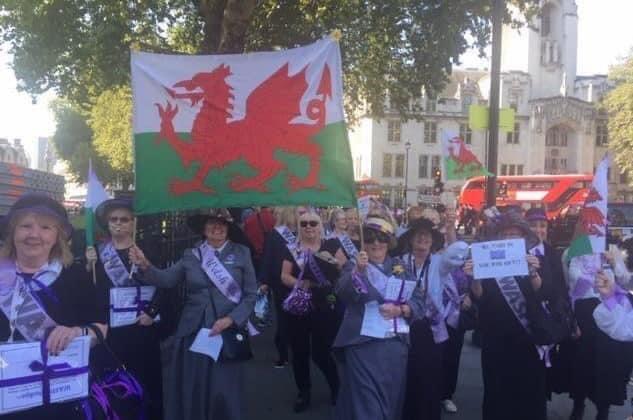News
1950s women of Wales in petition call for Public Inquiry over pensions

MORE than 8,000 people have signed a new online petition calling for a public inquiry into the 1950s women state pension scandal. Local organiser, Jackie Gilderdale said “an inquiry is necessary to expose the truth”.
Kay Clarke, the founding member of the the largest 1950s women group in Wales, “1950s Women of Wales” and posted the ‘Hold a Public Inquiry into state pension age changes for women’ petition on the petitions-parliament website. It states: “We request a Public Inquiry into their State Pension age changes for women, which we believe have left many in a state of financial and mental despair. We believe the Government has had little or no consideration of the circumstances, historic inequality, mental health and wellbeing of 1950s women.
At 10,000 signatures the petition would be entitled to a written response from the UK Government. At 100,000, it would be considered by the Petitions Committee for debate in Parliament.
After a six-year investigation, the Parliamentary and Health Service Ombudsman (PHSO) published its final report on March 21 which said that the Department for Work and Pensions (DWP) failed to adequately communicate changes to women’s State Pension age, and those affected are owed compensation and to date the UK Government have failed to respond to that request and failed to a request for mediation with representatives from all 50s womens groups.
As a result of its findings, the Ombudsman has asked Parliament to intervene and “act swiftly” to make sure a compensation scheme is established.
The Secretary of State for Work and Pensions, Mel Stride MP, recently said he will return to the House of Commons “when there is something to say” about a decision on whether women born in the 1950s affected by changes to the State Pension age should receive compensation.
The Pembrokeshire and Carmarthen West 1950s Women of Wales group, lodged an official complaint with the Ombudsman & the APPG (All Party Parliamentary Group) in relation to the 1950s women and the PHSO report.
Jackie said “Everyone was floored by the outcome last month, which was derisory and insulting for women born in the 1950s, the majority of whom who were not told about a change to their state pension”.
“We believe the PHSO investigation has been flawed and full of irregularities and mistakes since its inception, as it failed to take into consideration proven discrimination and only investigated maladministration, which turned out to be partial. The Ombudsman should have been legally challenged at stage one, as they wiped out 10 years of maladministration (95 to 2005) simply because the civil service code of practice did not mention/include the duty to inform those involved. So they couldn’t be accused of maladministration”.
Any actual financial remedy, could be through a Parliamentary mechanism such as the CEDAW Temporary Special Measure.
The United Kingdom government has an obligation to 1950s-born women arising out of the direct discrimination exercised against them when the State Pension Age at which the pension accrues was raised from 60 years to 65 years.
The 1950s-born women were specifically targeted as the group that would bear the burden of this transition. They were targeted by reference to the protected characteristics of sex/gender and age. No notice was given to the women and, when the Department of Work and Pensions (DWP) eventually did begin notifications this was inadequate, sporadic, disorganised and is recognised as infused with maladministration. This is well substantiated.
Any proposal to ‘pay off’ the 1950s-born women with a sum that does not equate to their rightful entitlement is one inconsistent with the Equality Act 2010 and the international obligations of government and Parliament per CEDAW – the Convention on the Elimination of All Forms of Discrimination Against Women – signed by the United Kingdom in 1981, ratified by the United Kingdom in 1986, and the United Kingdom signing up to the Optional Protocol in 2004.
No member of government and no member of Parliament should accede to a position where she/he supports a breach of domestic law and ignores or condones ignorance of international law.
The APPG Co Chairs, Rebecca Long Bailey MP and Peter Aldous MOP have invited Jackie and Kay Clarke to a meeting on May 13th to discuss the issue further. The voices of the 50s Women of Wales have not been heard by the PHSO and further evidence needs to be presented along with the ask of Welsh Parliament.

Charity
Vincent Davies raises £13,682 for air ambulance charity

Independent Haverfordwest store backs lifesaving crews with year of community fundraising
A WEST WALES department store has raised more than thirteen thousand pounds for a lifesaving emergency service after a packed year of community fundraising.
Staff at Vincent Davies Department Store collected £13,682 for the Wales Air Ambulance Charity, after voting the organisation their Charity of the Year for 2025.
The independent retailer organised events throughout the year, including an Easter bingo, bake sales, quizzes, raffles, staff sales, Christmas jumper days and a festive wreath-making workshop. Charity jam jars placed in Café Vincent also helped gather steady donations from customers.
One of the most popular attractions was the store’s charity singing penguin trio, which drew smiles from shoppers of all ages and boosted collections.
Sarah John, Joint Managing Director at Vincent Davies, said: “Raising £13,682 for the Wales Air Ambulance Charity is something we are extremely proud of at Vincent Davies Department Store. As a director, it’s wonderful to see our community come together to support a charity that makes such a lifesaving difference.”
The air ambulance is consultant-led, delivering hospital-level treatment directly at the scene of serious incidents and, when needed, transferring patients straight to the most appropriate specialist hospital.
Working in partnership with the NHS through the Emergency Medical Retrieval and Transfer Service, crews can provide advanced critical care including anaesthesia, blood transfusions and even minor surgical procedures before reaching hospital.
Operating across the whole of Wales, its teams travel the length and breadth of the country by helicopter and rapid response vehicle to reach patients quickly in both rural and urban areas.
This is not the first time the Haverfordwest store has backed the cause. In 2016, staff previously raised £5,831 when the charity was also chosen as their beneficiary.
Mike May, the charity’s West Wales Regional Fundraising Manager, said: “We are so grateful to Vincent Davies Department Store for raising an incredible amount for our charity. Throughout the year they put on a variety of different events and what a successful fundraising year it was.
“The charity needs to raise £13 million every year to keep our helicopters in the air and our rapid response vehicles on the road. By raising £13,682, the staff and customers have played an important part in saving lives across Wales.”
The store says it will announce its Charity of the Year for 2026 in the coming weeks.
Crime
Police assess complaints over Mandelson–Epstein links

Met says allegations will be reviewed to see if criminal threshold is met following release of US court files
SCOTLAND YARD is reviewing a series of complaints alleging possible misconduct in public office after fresh claims emerged linking former UK ambassador Peter Mandelson to convicted sex offender Jeffrey Epstein.
The Metropolitan Police Service confirmed it has received “a number of reports” following the publication of millions of pages of material by the United States Department of Justice, and will now decide whether any alleged conduct reaches the level required for a criminal investigation.
Commander Ella Marriott said the force would assess each report individually, stressing that a review does not automatically lead to formal proceedings.
The documents, widely referred to as the “Epstein files”, appear to show Mandelson corresponding with Epstein while serving as business secretary during the government of Gordon Brown at the height of the global financial crisis.
According to reports, Epstein was allegedly given insight into internal policy discussions, including proposals around banker bonus taxes in 2009 and details of a eurozone bailout package shortly before it was announced publicly.
Payments questioned
Bank records cited in the US disclosure reportedly show payments totalling 75,000 US dollars made to Mandelson between 2003 and 2004. It is also claimed Epstein paid for an osteopathy course for Mandelson’s husband.
Mandelson has denied any wrongdoing and said he has “no record or recollection” of the alleged transfers.
On Sunday he resigned his membership of the Labour Party, saying he did not want his continued association to cause further difficulty for the party.
In interviews, he dismissed suggestions that Epstein influenced his decisions as a minister and said nothing in the released files pointed to criminality or misconduct on his part.
Pressure mounts
The political fallout has intensified, with Downing Street confirming Keir Starmer has asked Cabinet Secretary Chris Wormald to carry out an urgent review into Mandelson’s historic contacts with Epstein while in office.
Brown has also called for an examination of whether any confidential or market-sensitive information was improperly shared during the financial crisis.
The case is the latest in a series of controversies linked to Epstein’s long-standing relationships with powerful figures on both sides of the Atlantic.
Police emphasised that no charges have been brought and that Mandelson is not currently under criminal investigation, but said the complaints process would be handled “thoroughly and impartially”.
Community
Councillor meets chief constable to address Monkton and Pembroke concerns

COUNTY COUNCILLOR Jonathan Grimes has met with the new Chief Constable of Dyfed-Powys Police to discuss crime, antisocial behaviour and wider community issues affecting residents in Pembroke and Monkton.
Cllr Grimes, who represents Pembroke St Mary South and Monkton, said the meeting followed his invitation for senior police leaders to visit the area and hear first-hand about local concerns.
The Chief Constable, Ifan Charles, attended alongside officers from the Pembroke Neighbourhood Policing and Protection Team, meeting the councillor in Monkton for what were described as open and constructive talks.
As part of the visit, they also spoke with Monkton Priory Community Primary School headteacher Dylan Lawrence and Danny Nash from Pembrokeshire County Council Housing Services to gather views from education and housing professionals.
Discussions covered a range of issues raised by residents, including domestic abuse, drug and alcohol misuse, antisocial behaviour and environmental concerns such as littering, dog fouling and dangerous or inconsiderate driving.
Cllr Grimes acknowledged recent police successes, particularly in tackling drug-related activity, but said enforcement alone would not solve the area’s challenges.
He said closer cooperation between the police, council services, schools and the wider community would be needed to deliver longer-term improvements.
The councillor added that he plans to encourage residents to form a local community group in the coming weeks, aimed at developing practical solutions and strengthening partnership working across the area.
-

 Health5 days ago
Health5 days agoConsultation reveals lack of public trust in health board
-

 News6 days ago
News6 days agoCaldey still unsafe, survivors warn — despite Abbey’s reform claims
-

 Community6 days ago
Community6 days agoPembrokeshire students speak at national Holocaust Memorial Day event
-

 News6 days ago
News6 days agoKurtz raises Gumfreston flooding in the Senedd as petition deadline nears
-

 Crime7 days ago
Crime7 days agoMan denies murdering brother as jury hears of ‘ferocious attack’ at Morriston flat
-

 Entertainment7 days ago
Entertainment7 days agoRapunzel brings festive magic to Torch Theatre
-

 Community7 days ago
Community7 days agoStorm Chandra: Morning impacts across Pembrokeshire
-

 Business7 days ago
Business7 days agoKurtz Calls for face-to-face LINK meeting in Dock over Banking Hub Review


























